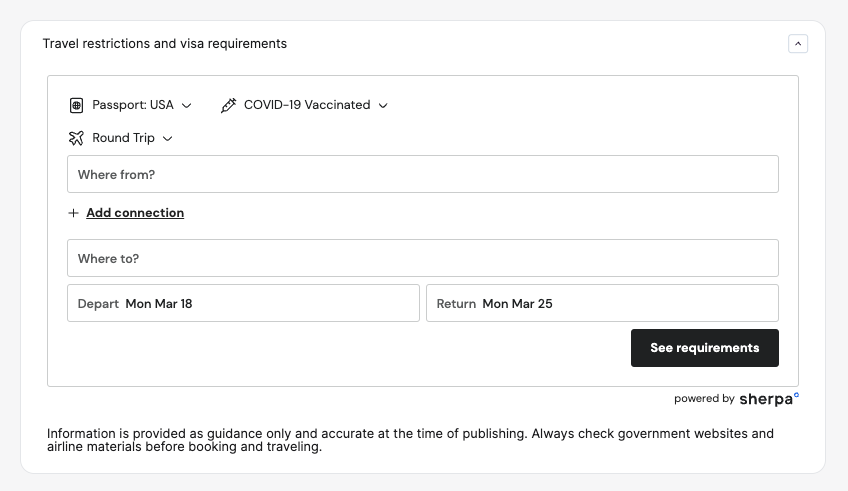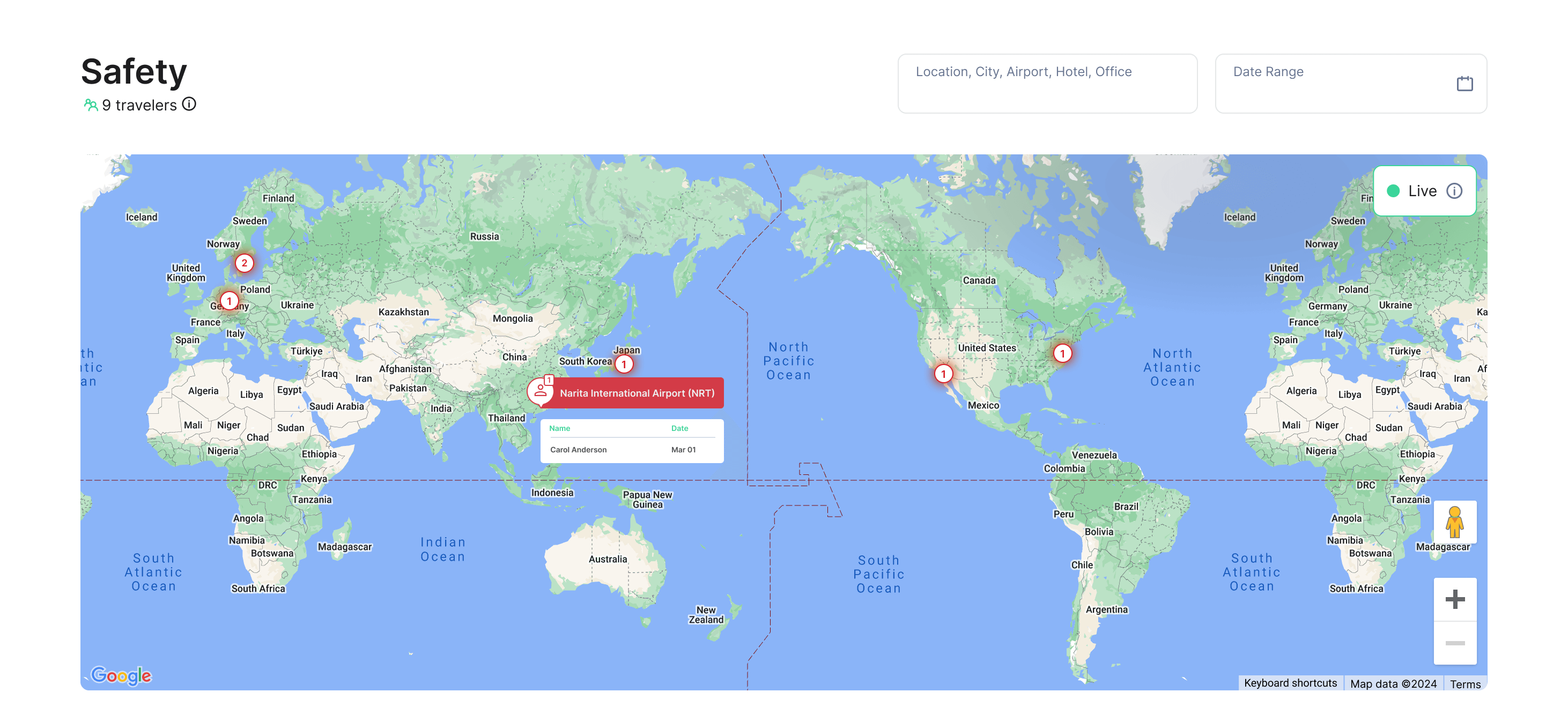The complete guide to corporate travel planning and management
Transform your corporate travel planning approach with our step-by-step guide. Discover time-saving planning tricks and helpful checklists that make traveling a seamless experience for everyone.

Planning global business travel is a high intensity job, requiring you to think through every single scenario of getting from A to B, not to mention having to make last minute changes to itineraries and schedules. But whether you're planning small or big trips involving one or multiple employees, meticulous preparation is key. This article aims to help you ensure that when you're designing your corporate travel program, you're not only creating a seamless travel experience for those traveling, but that you can enjoy a stress-free time back at the office and focus on the things that need to be ticked off your to-do list.
Table of Contents |
What is corporate travel planning?
You don't need to have worked in the travel industry, or be a full time travel manager to get the hang of corporate travel planning. It's just about creating smooth and seamless processes and a positive travel experience for those traveling in your company, while also sticking to the company's travel policy. Good business travel planning and managment makes sure that everyone gets the most out of business travel, but that the company can also save money and resources in the process. There are a few key areas that you'll need to be aware of if you're new to business travel planning and those include:
- Booking transportation - including all flights, trains, rental cars and taxis
- Booking accommodation - finding the right hotels and rates based on budget and distance to meetings or events
- Preparing a detailed itinerary - compiling all the travel details into an easy-to-use format for the business traveler
- Coordinating meetings and networking events - being part of planning and scheduling business meetings or events
- Handling travel documents - updating passports, or identifying the right visa or any documentation that's needed
- Handling expenses - tracking and monitoring corporate travel expenses
- Complying with the company's travel policy - including safety protocols or other specifications in place
A good travel program can make a huge difference for everyone involved and can make travel an enjoyable experience, both before, during and after the trip. Having a well managed corporate travel planning strategy is also especially important for companies that travel regularly for work, such as consulting firms, tech companies, sales and marketing agencies or businesses operating complex manufacturing and supply chains.
Why is corporate travel planning important?
A 2023 study from the travel industry found that 83% of business travelers see business travel as a positive experience, and 79% of those say that it improves their overall job satisfaction. All the more reason to "get it right" for your employees. But aside from the value it brings your employees, corporate travel planning is important to ensure cost saving, employee productivity, and that you get the most out of the "investment" in the trip itself.
Furthermore, when employees are traveling on behalf of the company, it's your responsibility to keep them safe, so having a robust corporate travel policy in place can help make sure that you've thought of everything and worked through any potential travel emergencies that could arise.
79% of employees say that business travel improves their job satisfaction
Who should be involved in corporate travel planning?
There are a number of stakeholders involved in managing business travel, both directly and indirectly. Ultimately, the person that has to book flights and manage travel costs, such as the executive assistant, office manager, travel manager, or even employee will carry the final responsibility for the smooth running of the trip, but there are a number of people behind the scenes that monitor how much you've spent, who design the travel policy and ensure that a good framework is in place.
These are:
- Office Manager, executive assistant or travel manager: In charge of business travel management, including the relationship with relevant suppliers such as travel agents.
- Finance: Control travel budgets, expenditure, and "per diems" (the daily amount of money that employees can expense when they're traveling for work)
- Human Resources: Design and implement the travel policy. This includes guidance on how travel should be booked, the approval process, expense reimbursement, risk management, and duty of care.
- The Executive Team: Evaluate the role and cost of travel and its value to the business.
- IT: Implement new software or booking systems, and work with HR to roll it out to new users across the organisation.
- Employees: Sometimes responsible for planning and booking trips themselves with a booking tool.
|
Empower your team, but stay in control. Goodwings has more self-service tools than any other platform, giving employees more flexibility to book and manage their own travel. See how it works here. |
Corporate Travel Management - Pre-booking checklist
1. Get to know corporate travel preferences
To understand traveler preferences, look at past business trips and travel data to learn about seat preferences, preferred airlines (so they can earn rewards for their loyalty program), meal requests, or hotels they like and have stayed at before. If you're using an online booking tool like Goodwings, you can save time by accessing all this historical data in one platform, which will save you time planning business travel.
2. Read the travel policy
Company travel policies clearly define dos and don'ts for booking business travel, including sustainability efforts to reduce your company's emissions. These policies offer detailed advice on flight and hotel bookings to minimize environmental impact, alongside protocols for emergencies to mitigate travel risks. With online booking tools, these policies are integrated, displaying only the permitted options for booking flights, hotels, and transportation, streamlining the booking process by eliminating the need to sift through unsuitable choices.
|
Create a corporate travel policy before your next trip. We've done the heavy lifting so you don't have to, with our downloadable template. Simply copy, paste and adjust to suit your needs. |
3. Understand your corporate travel budget
Before booking, familiarize yourself with the budget and any spending limits in your travel program. For client-paid trips, ensure all expenses are transparently documented to justify the chosen options. Remember, while travelers may not focus on costs, the finance department will. Booking frequent trips to the same destinations? Negotiate rates with travel providers for company-wide benefits. Also, connect with the finance team early for guidance on managing expenses, making international payments, and streamlining reimbursements.
4. Get all the right documents in place
Make sure that you have all the documentation you need to ensure a smooth arrival in the country. This includes an up-to-date passport (with at least 6 months validity), any necessary visa requirements, or vaccinations. Visa requirements can change, so it's worth staying up to date with the latest information or integrating a service like Sherpa into your corporate travel management platform, where you can apply for visas in one central place.

When you book with Goodwings, you'll get a reminder on any necessary visa requirements for your business trip
Corporate Travel Planning: Pre-travel checklist
1. Prepare a detailed itinerary
Step into the traveler's shoes and build a detailed itinerary. You're more familiar with the details than the traveler, so you need to transfer all that crucial information from your mind to the itinerary, including the route from office to airport, transportation specifics, check-in procedures, and emergency contacts. Avoid the hassle of digging through emails for travel details. Consider the traveler's preference for receiving this information, whether printed or digitally via a travel app. If using online booking tools or TMS, preload the app on the traveler's phone to consolidate all travel details in one accessible location.
2. Optimize time outside of scheduled meetings
Transform travel downtime into productivity (or leisure!). Find out whether they want to spend time exploring the city, or whether they’d prefer catch up on calls especially during transit or waiting periods. If they're keen to explore, do some research and create a business travel itinerary with some insider's tips for essential activities, foods to try or landmarks to visit. If they want to just keep their head down and do some work, find quiet spots along the way where they can access Wi-Fi, such as in the business lounge.

When you book with Goodwings, you get an AI-inspired business travel itinerary with ideas for places to visit during your business trip.
3. Do some local research
Give them some guidance on local culture or customs, and some simple phrases that will help them get by. It may seem over the top, but first impressions count and the more information you can give them upfront, the more likely they are nail that networking event. For example, in China and Japan, it is customary to bring a small gift to a business meeting as a sign of respect, gratitude and kindness. Beyond the customs and phrases, provide weather updates so they can pack appropriately, and flag any visas so they’re organised ahead of time.
4. Set a strategy for managing corporate travel expenses
Streamlining expenses saves time, money and reduces paperwork. Use a travel management system to consolidate expenses in one spot by connecting it with your company's expense software. If you don’t have one in place, align with the finance team on their expectations for submitting expense reports and coordinate with travelers accordingly. Alot of companies are using expense tools nowadays, but you still need to keep track of spending.
5. Get some local currency
While credit and debit card payments are accepted at almost every destination now, there are still a lot of countries where cash is king, so make sure the traveler has local currency if it's needed, as well as an idea of the exchange rate and the average cost of a cup of coffee for reference!
6. Check all the details again
No-one needs to tell you to be thorough - it's probably in your DNA.., but it's always worth double checking all the details before the business trip, reconfirming every aspect of the journey to ensure a smooth travel experience all the way. Confirm flight times, hotel bookings, taxi rides and any appointments you've scheduled.
7. Always have a back up plan
Always anticipate potential disruptions, or safety risks with a contingency plan. You can't predict flight cancellations, traffic jams or weather patterns, but you can be on standby with some back up options. Usually when the traveler misses a flight or connection, they'll call you (day or night!), but with new travel management tools and 24/7 support teams, there are now more tools than ever that can help them in those situations, without the need to call you. That's why it's worth investing some time to show those traveling in your team the tools that they have at their disposal, so that you don't get caught in the middle of a situation that could be handled directly in the app, or with someone who can solve the problem there and then.
Corporate Travel Planning: During-travel
1. Stay up to date
Stay updated with travel updates so you can address any issues before they arise. With a travel management system, you can keep track of travelers with interactive map features. This means that should there be any sudden changes in the country they're visiting (such as social unrest, political situations or emergency weather warnings), you’re prepared and can find a solution. After all, quick solutions contribute to the overall success of the trip and show that you’re dedicated to making it a smooth trip.

Goodwings' duty of care feature, which allows you to keep track of employees when they're traveling
Summing up
When done properly, corporate travel planning can help streamline your company's travel program, and create a more enjoyable experience for everyone, but there are a number of considerations to take into account during the planning process. Here's a summary!
PRE-BOOKING✔️ Get to know your employees' travel preferences✔️ Get familiar with company policies✔️ Understand the travel budget that you're working with✔️ Get all the important documents in place |
PRE-TRAVEL✔️ Prepare a business travel itinerary✔️ Optimize time outside of scheduled meetings✔️ Do some local research✔️ Set a strategy for how you'll manage corporate travel expenses✔️ Get some local currency✔️ Check all the details.. again!✔️ Always have a back up plan |
DURING TRAVEL✔️ Stay up to date with your employees' movements, and anticipate any last-minute changes! |


